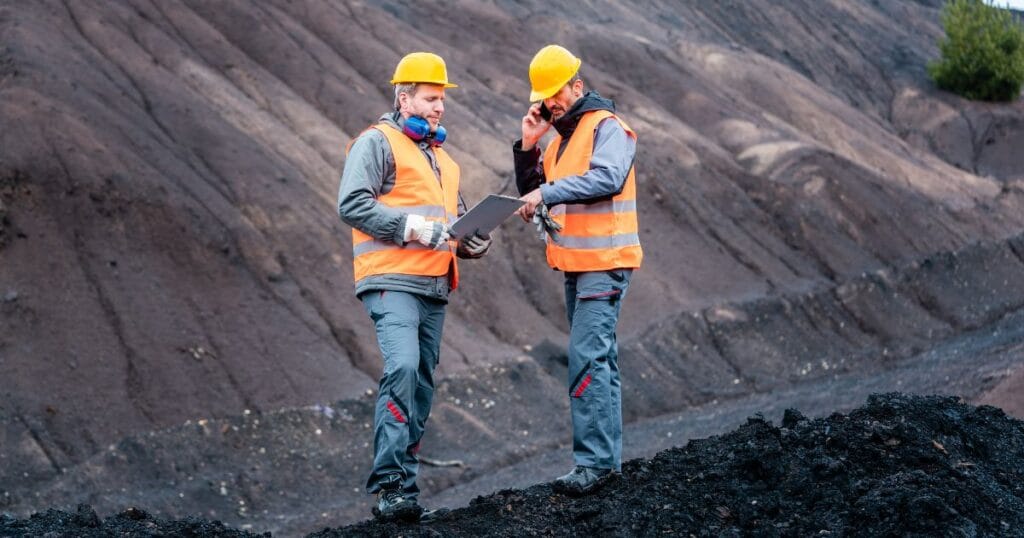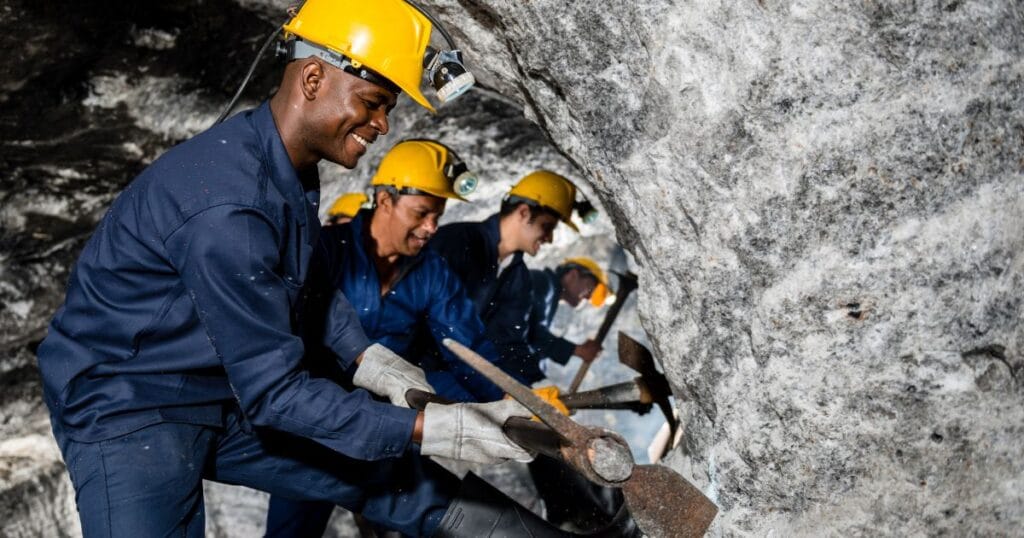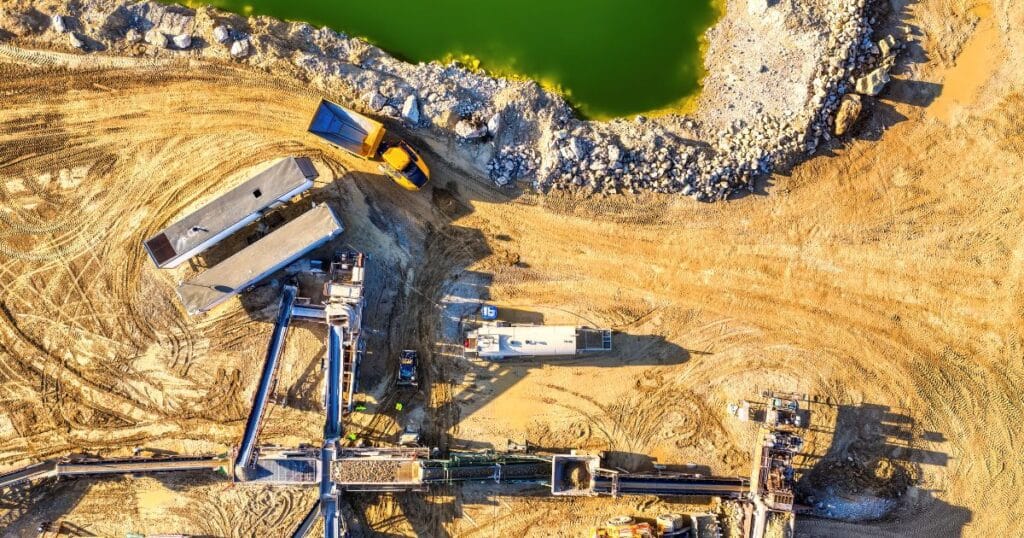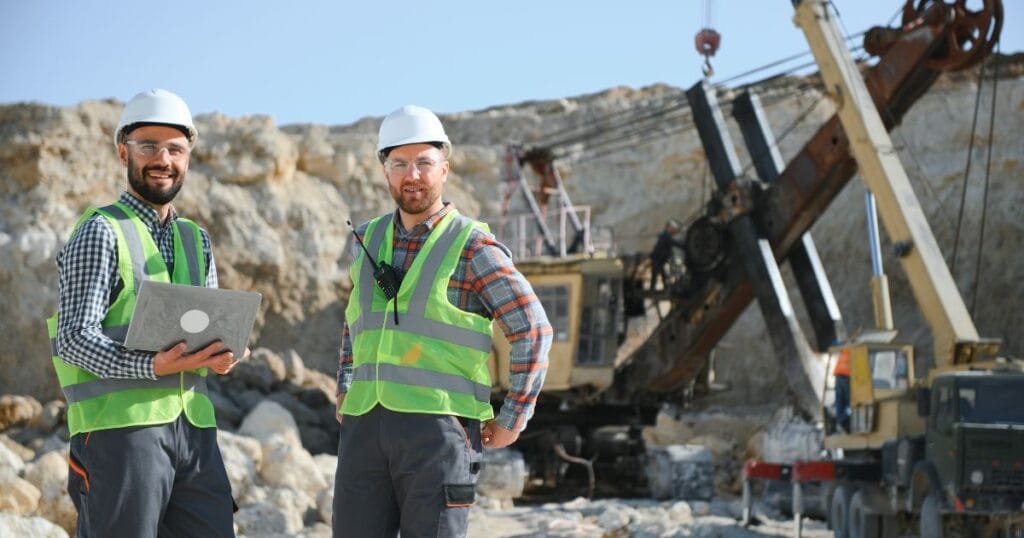Last updated on January 5, 2026
Mining engineering is the branch of engineering focused on the extraction of minerals from the earth, and the planning, development, and management of mining operations. Mining engineers work across all stages — from exploration and discovery, through mine design, development, production, and closure.
For anyone looking at a career in mining, this guide covers what mining engineering involves, the courses you’ll need, job opportunities, salary expectations, and more.
Table of Contents
What Is Mining Engineering?

Mining engineering involves applying engineering principles, technology, and scientific knowledge to locate, evaluate, and extract mineral resources while balancing cost, safety, and environmental considerations.
In practice, a mining engineer may:
- Plan the layout and design of a mine (surface or underground).
- Select appropriate extraction methods, evaluate mineral deposits, and supervise mining operations.
- Ensure that the mine is safe, efficient, and minimizes environmental impact.
If you’re curious about specific infrastructure inside mines (for example, the structure of a head-frame or the workings of a winding house).
Courses & Requirements for Mining Engineering
Entry Requirements & Subjects
To study mining engineering, you’ll typically need to complete a relevant engineering degree (such as a Bachelor of Engineering in Mining Engineering) or equivalent diploma.
High school subjects that support this path include:
- Mathematics (especially calculus)
- Physics
- Chemistry
- Geography / Earth Science
Universities often list these among their entry requirements.
What to Expect in the Course
Mining engineering education covers a broad range of topics: geology, rock mechanics, mine ventilation, mine design methods (surface and underground), mineral processing, and environmental management.
If you want hands-on with mining infrastructure, you may also enjoy exploring how mines operate internally — for example, What Happens in the Winding House of a Mine?
Specialisations & Electives
Students may choose to specialize in areas like:
- Underground mining methods
- Surface mining (open-pit)
- Mineral processing and metallurgy
- Mine sustainability & closure
- Automation in mining operations
Where You Can Study Mining Engineering in Africa
There are many universities worldwide and in Africa that offer mining engineering programs. When choosing a school, consider: accreditation, links to the mining industry, internship opportunities, and local relevance of mineral resources.
- University of the Witwatersrand (Wits), South Africa – School of Mining Engineering
- University of Pretoria (UP), South Africa – Department of Mining Engineering
- University of Johannesburg (UJ), South Africa – BEngTech / BEng Mining Engineering
- University of Mines and Technology (UMaT), Ghana – Faculty of Mining & Minerals Technology
- University of Zambia (UNZA), Zambia – BEng Mining Engineering
- Copperbelt University (CBU), Zambia – School of Mines & Mineral Sciences (Mining Engineering)
- Taita Taveta University (TTU), Kenya – Department of Mining & Mineral Processing Engineering
- Jomo Kenyatta University of Agriculture & Technology (JKUAT), Kenya – School of Mining/Materials/Processing Engineering
- Namibia University of Science and Technology, Namibia
- University of Botswana (UB), Botswana – Bachelor of Engineering (Mining Engineering)
- Botswana International University of Science & Technology (BIUST), Botswana – Mining & Geological Engineering
- University of Zimbabwe (UZ), Zimbabwe – Department of Mining Engineering
- École Nationale Supérieure des Mines de Rabat (ENSMR / Mines Rabat), Morocco – Mining Engineering School
Jobs & Career Paths in Mining Engineering

Typical Job Roles
Mining engineers can occupy various roles, such as:
- Mine planner or design engineer
- Production engineer
- Technical superintendent
- Safety and ventilation engineer
- Mine closure and rehabilitation specialist
These roles may be located on-site (mine operations) or in offices/design consultancies, depending on the stage of the mine.
Demand & Industry Outlook
Globally, the job outlook for mining and geological engineers is modest with slower-than-average growth.
However, in resource-rich regions (including parts of Africa), demand remains for competent engineers who understand modern mining methods, technology, safety, and sustainability. If you need help writing an email for your job application, you can check out our easy guide: How to Write an Email for a Job Application: 6 Simple Steps That Work.
Salary Insights in South Africa & Regionally
South Africa Summary
Average salary for a Mining Engineer professional in South Africa: approximately R 682,882 per year, according to recent data.
Some sources report an average of R 443,166 per year for a broader sample, with entry-level around R 205,000 and senior engineers exceeding R 1,500,000.
For specific locations: e.g., in Kathu, Northern Cape, the average base salary reported is R 943,931 per year.
These numbers reflect base salary and vary significantly with experience, location (remote mines typically pay more), specialization, and shift allowances.
Global/Other Benchmarks
In the U.S., average salary figures for Mining Engineers sit around US$85 000 per year.
These benchmarks give you a sense of global pay scales and how they compare with those in Africa.
What Affects Salary
Salary varies by:
- Experience level (entry, mid, senior)
- Location and remoteness of the mine site
- Specialization (ventilation, mine closure, rock mechanics)
- Shift patterns, allowances, and bonuses
- Company size and mineral type (precious metals tend to pay more)
Bursaries, Internships & Entry Opportunities
Many mining companies, universities, and industry associations offer bursaries or internships to support students studying mining engineering. When searching for one:
- Check company websites in your region (mining houses, metals companies)
- Ensure the bursary covers tuition + practical training
- Look for internships that offer hands-on experience in a mine site (valuable for career entry)
These opportunities help students meet the requirements for mining engineering jobs and build early industry exposure.
Future of Mining Engineering

Mining engineering is evolving. Key trends influencing the field:
- Automation and digitalization (drones, IoT, remote monitoring)
- Emphasis on sustainability, environmental impact, and mine closure planning
- Shift toward extracting critical minerals (for batteries, renewable energy)
For students and engineers, staying current with these developments adds value and improves career prospects.
Frequently Asked Questions
Is mining engineering a good career?
Yes — it offers a technically demanding role, opportunities in resource-rich regions, and competitive salary potential. However, it may involve remote locations and shift work.
How much do mining engineers earn?
In South Africa, the average salary is around R 443,000 to R 683,000 per year, depending on experience and location. Some senior engineers exceed R 1,000,000.
Which subject is best for mining engineering?
Strong foundations in mathematics and physics are critical. Chemistry and earth science/geology also help.
How much do mining engineers make in Kenya?
Specific Kenya data is less widely published. However, salaries in local currency will generally be lower than those in major mining hubs like South Africa, and will depend on company, role, and mineral type.
Which university is best for mining?
There’s no single “best” university. Choose one with an accredited mining engineering program, links to local mines/industry, internship opportunities, and practical exposure.
What is the future of mining engineering?
The field will continue to play a key role in global resource supply. Engineers who specialize in sustainability, automation, and critical mineral extraction will be in high demand.
Conclusion
Mining engineering offers a challenging and rewarding path for those passionate about resource extraction, engineering design, and sustainability. With the right education, practical experience, and location choice, it can lead to strong career opportunities with competitive salaries. As the industry evolves, staying informed and building technical skills will help you stay ahead.

Varsha Asrani is a lecturer and education writer with experience as Visiting Faculty at AUPP and ATMC College, and as a Lecturer with TalentEdge and UpGrad. She is the Founder of the Asrani Institute of Education and Counselling. Varsha specializes in scholarships, e-learning, and career guidance for African students and professionals, and regularly visits Africa to gather first-hand insights that shape her research and articles.




